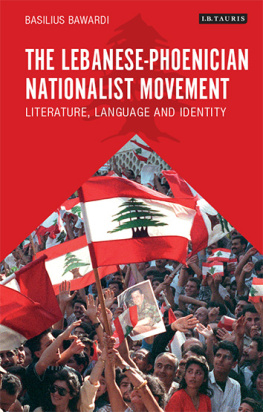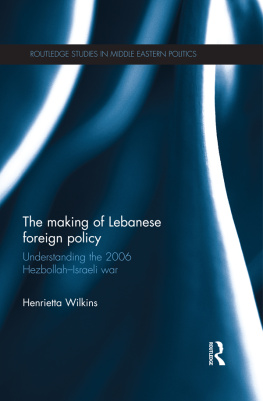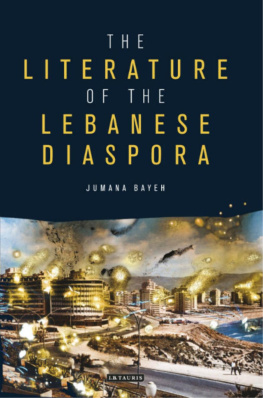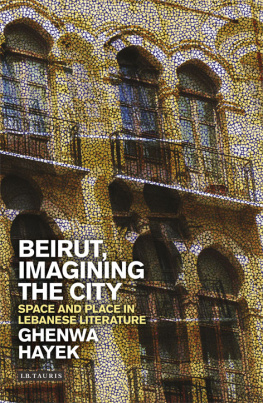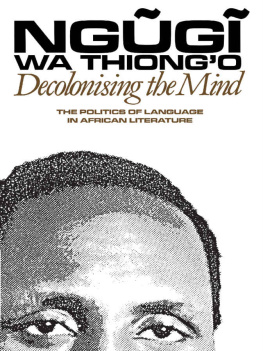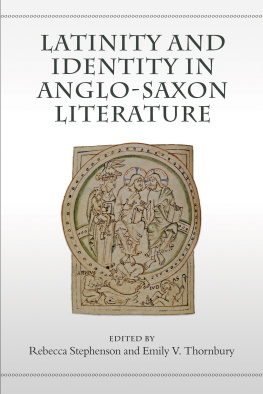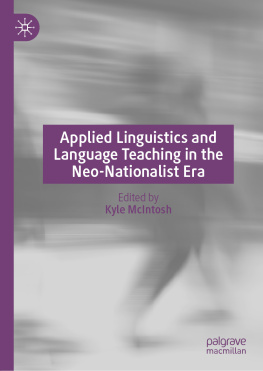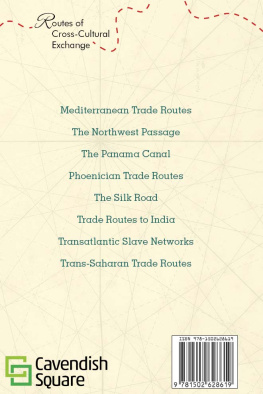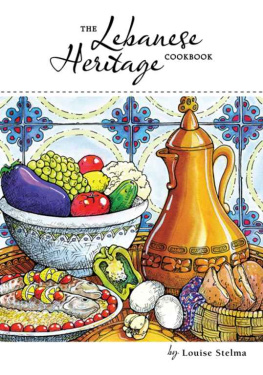Basilius Bawardi is Senior Lecturer at Bar Ilan University and Oranim College, Israel. He holds a PhD in Arabic Literature and Language from the University of Haifa. He has published in the journals Middle Eastern Literature and Al-Karmil and in the books Ottoman Reform and Muslim Regeneration; The Lebanese Anthology of Mrs Awwd and Monotheism & Ethics: Historical and Contemporary Intersections Among Judaism, Christianity and Islam.
Bawardi presents an innovative combination of thorough textual research and theoretical arguments. The volume highlights the complex links between ideologies and language that have contributed to forming the Phoenician-Lebanese identity.
Fruma Zachs, Professor and Head of Middle Eastern History, Department of Middle Eastern History, University of Haifa
In his book, Basilius Bawardi presents three Lebanese poets: Sad Aql (19122014), May(y) Murr (19292008), and Mrs Awwd (born in 1934). Their literary work reflects two contemporary anti-Arab, and anti-Sunni, partly overlapping movements in Lebanon: Phoenicianism, proclaiming the Phoenician origins of the Lebanese people, and linguistic nationalism, which aims to introduce Lebanese Arabic as the official national language in the country, and to replace Arabic script with the new Latin alphabet created by Sad Aql. Although these ideological trends have been studied in recent years by several scholars, Bawardi takes an original methodological perspective, based firstly on literary criticism and studies on the history of ideas. As he has previously translated into Hebrew sections of Mrs Awwd's work, he is also sensitive to its linguistic form.
Arkadiusz Ponka, Assistant Professor, Institute of Oriental Studies, Jagiellonian University
THE LEBANESE
PHOENICIAN
NATIONALIST
MOVEMENT
Literature, Language and Identity
B ASILIUS B AWARDI
Published in 2016 by
I.B.Tauris & Co. Ltd
London New York
www.ibtauris.com
Copyright 2016 Basilius Bawardi
The right of Basilius Bawardi to be identified as the author of this work has been asserted by the author in accordance with the Copyright, Designs and Patents Act 1988.
All rights reserved. Except for brief quotations in a review, this book, or any part thereof, may not be reproduced, stored in or introduced into a retrieval system, or transmitted, in any form or by any means, electronic, mechanical, photocopying, recording or otherwise, without the prior written permission of the publisher.
References to websites were correct at the time of writing.
Library of Modern Middle East Studies 185
ISBN: 978 1 78453 237 6
eISBN: 978 1 78672 012 2
ePDF: 978 1 78673 012 1
A full CIP record for this book is available from the British Library
A full CIP record is available from the Library of Congress
Library of Congress Catalog Card Number: available
To my mother Tarez and father Hanna,
who left this world long before their time.
May this book be a loving memory of their
short stay in this world.
NOTE ON TRANSLITERATION
Arabic terms have been used throughout this book. For the most part, transliteration is in accordance with the International Journal of Middle East Studies. In the case of some names of individuals or families, I have chosen the name most commonly used by these individuals or families themselves. In some cases I also chose to write the titles of books, articles and poems in Lebanese dialect.
ACKNOWLEDGEMENTS
The research underlying this book started with conversations with the late Professor David Tzemah of the department of Arabic Language and Literature at Haifa University. I was studying for my MA at the time. Professor Tzemah brought to my attention several ideological texts written by members of a separatist Lebanese nationalistic group. The result of these conversations was my MA thesis, submitted in 1998. Under the supervision of Reuven Snir, I analysed the nationalistic discourse of two groups: the Phoenician-Lebanese and the Syriac. I owe a great debt to Professor Snir, for his meticulous, thorough supervision, and his ongoing encouragement.
This book is based in many ways on this research, the subject of which is of personal interest to me as a descendant of a family of Lebanese origin. I am much intrigued by the complex interaction between nationalistic ideology and literary creation. The book reveals this complexity, as well as that of Arab nationalism. The unique voice of the Lebanese nationalistic movement demonstrates the colorful fabric of Arab nationalism and identities. These questions interest me not only in terms of academic research, but also in my everyday life.
In writing this research I benefitted from the help of many good friends and colleagues, who generously contributed their knowledge and energies. Special thanks are due to: Professor Angelika Neuwirth from Freie Universitt in Berlin, Fruma Zachs from the Middle East Department at Haifa University, Professor Joel Walters, Dr Livnat Holtzman, Professor Eliezer Schlossberg, Professor Tzvi Langermann, Professor Binyamin Abrahamov of Bar Ilan University, thank you for being good friends and colleagues. To Professor Arkadiusz P?onka from jagiellonian University in Krakow for generously spending time listening and thinking with me, for reading a previous version of this book and making many helpful comments which contributed greatly to the final outcome. I would also like thank Professor Kais Firro, of Haifa University and Dr Nurit Melnik and Professor Neima Barzel of Oranim College. I also wish to thank the Research and Evaluation Authority in Oranim College for their financial support.
My deep thanks to Ms Maha Najjar for her generous assistance in preparing this book, and to Ms Marion Lupo, Ms Suha Sibani and Dr Keren Abbou Hershkovits for editing it with such care and skill.
Last, but definitely not least, my family; without the support I received from you all, this book would not have materialized. My wife, Joanna, did all in her power (and then some) to give me the time and space needed to write this book. I thank her for years of friendship and support. To my son Hanna and my daughter Raya who made me see the world from a different perspective. While working on the final draft, Ivon Nakhleh Faranesh, my second mother, passed away after a brave fight against a vicious disease. I wish to honour her memory for being there for me all these years, I am sorry she cannot see the printed version.
There are many others who helped me along the way, more than I can mention here. All faults remain my own.
INTRODUCTION
On 1 September 1920, General Gouraud of France announced the establishment of Greater Lebanon (the country known as Lebanon today). This announcement changed the demographic fabric of the mutaarrifiyya (province) of Mount Lebanon due to violent reactions among the inhabitants of the area, particularly between the Christian and Druze populations. This bloodshed brought about yet another development: the French, determined to protect their protgs the Christian inhabitants of the area announced the establishment of the council of the mutaarrifiyya, headed by Maronite Christians. This council was granted autonomy in running Mount Lebanon.
In 1943, Lebanon declared its independence after years of French mandate. The composition of the government represented the various ethnic and religious/confessional groups inhabiting this region; a Maronite Christian president and a Sunni Muslim prime minister.


